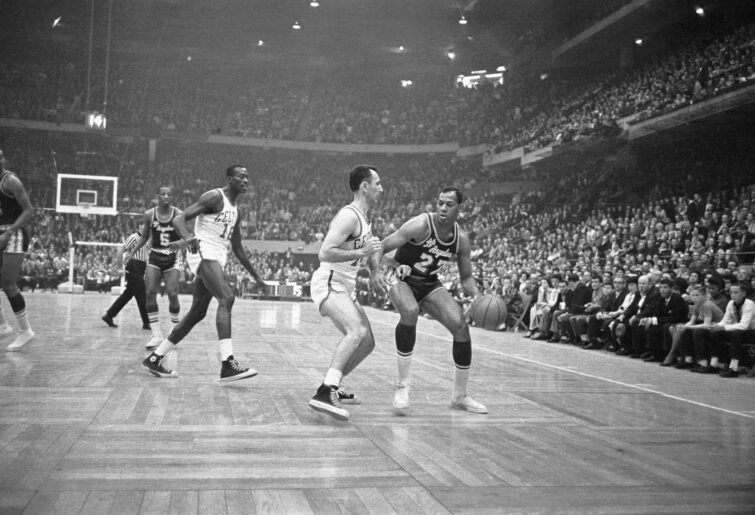NBA’s global stars usher in new era as LeBron, Steph, KD fade into the background
A Serbian, a Canadian, a Slovenian and a Greek fellow walked into a bar … Well, they’ve actually walked into the NBA and now…
Opinion
The National Basketball Association has become a way avenue to propel young, talented athletes into superstardom under the burning spotlights.
Nowadays, being a high draft pick almost certainly guarantees multi-millionaire status. A good showing at the collegiate level can set you up with million-dollar contracts before even stepping foot onto an NBA court.
However, it wasn’t always like this. There was a time when pro basketball in the USA was still divided between the NBA and ABA, a time when games would rarely be televised nationally, a time when basketball hadn’t even come to the West Coast.
It was in this era that gave rise to some of the greatest superstars the game has ever seen. The average fan would be able to tell you that this was the era of Wilt Chamberlain and Bill Russell, which, while correct, doesn’t do justice to the other greats, one of whom was Elgin Baylor.
So how was it that a kid from Washington D.C. gathered enough interest in his early days to save a struggling franchise from the brink of folding and become the first star in the West Coast?

Elgin Baylor, (right), of the Los Angeles Lakers, tries to maneuver the ball around Bob Cousy of the Boston Celtics during second quarter action. Image: Getty Images
Born in 1934, Elgin was a victim of a period in America which most people today would not be able to comprehend, a period in which rampant, institutional racism was commonplace.
While talent scouts today scour the United States in search of any overlooked talent, Elgin was disqualified by an overwhelming majority of scouts simply on the basis of his skin colour- despite putting setting record after record in high school, one of which was the still-standing record of 63 points in a single game.
However, not even that was able to garner recognition from the general public, with local news outlets dismissing the Spingarn High School basketball team’s undefeated streaks and their centrepiece Elgin Baylor’s 39.9 point per game pace in lieu of teams and athletes from white-only schools.
Later on, in a 1954 game which pitted Elgin and his Stonewall A.C. teammates against their white contemporaries, it was immediately made clear that Elgin was the best basketball player in Washington D.C.
It should also be noted that while this matchup was originally meant to be against white high school students, many could not participate in fear of suspension or expulsion by their schools.
While his talent on the court was a subject of awe, the same could not be said about his academic career. Despite protests from his family, he elected to take the 1953-1954 year off from high school.
His abysmal grades worsened his already low chances of getting a scholarship, but was eventually able to secure a football scholarship for the College of Idaho.
Elgin’s skills were immediately recognised, and after transferring to their basketball team, the once bear bleachers became filled to the brim with onlookers hoping to get a glimpse of the new talent which would lead them on an undefeated run in their conference, the freshman center who would average 31.3 points per game.
Despite this resounding success, the College of Idaho would cut their basketball program going into the next year, leaving Elgin in search of a new home.
Elgin found a match with Seattle University, with the university even accepting his request for them to offer scholarships to two of his Spingarn teammates.
Two months into the season, he had led the Seattle Chieftains to a 12-2 record averaging 27.7 points per game, with multiple 40+ point performances. They ended the season 23-3, and while he was frustrated with himself following an uncharacteristically bad loss in front of 10,000 people at Madison Square Garden, he explained to the press that he was grateful for his friends and family being able to see him play, and had enjoyed it.
Praise was given to him by his teammates as well, saying that the best thing about Elgin was that he was “not a hog” when it came to passing the ball.
Rejecting a $20,000 offer from the Harlem Globetrotters, he would spend the summer of 1957 facing off against Kansas University’s Wilt Chamberlain in D.C. in playground games which would have as many as 2000 spectators.
It was noted that while Wilt would pick the best players available for his teams, Elgin would make it a point to select more average players, putting himself and his skills in the forefront of their wins. In the 1957-1958 season, he would overshadow Wilt again by averaging 33.7 points and 23.5 rebounds per game, with only Cincinnati’s Oscar Robertson averaging more points.
The three would go on to be close friends, with Wilt serving as best man at Elgin’s wedding that summer.
Although he was eligible for the 1958 NBA Draft, there was widespread skepticism over Elgin’s willingness to go pro, despite owners salivating at the thought of him playing for their teams.
Bob Short, owner of the 19-53 Minneapolis Lakers (who had become incredibly unpopular following the retirement of George Mikan) managed to convince Elgin to participate in the draft, seeing it as the only way to revitalise the rock-bottom franchise which he had purchased in 1957 for $200,000.
New York Knicks owner Ned Irish was so enamoured by Elgin, who had put on a dazzling performance the year prior in Madison Square Garden, even offered Short $100,000 for the right to draft Elgin, which was promptly rejected.
Drafted first overall on April 22, 1958, and signed to a $20,000 per year contract, Elgin would eventually go on to be the West Coast’s first star player and Hall of Famer.